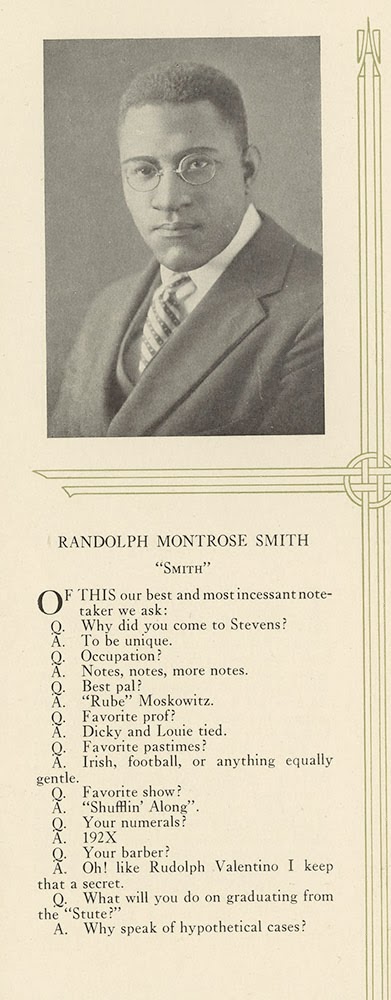By Leah Loscutoff,
Archives & Special Collections Librarian
Special thanks to Doris Oliver, Assistant Curator, for her assistance with the research for this blog post.
This is the second article honoring Black History Month at Samuel C. Williams Library
In 1937, esteemed Stevens alumni James Sylvester Braxton graduated. That same year heavyweight boxing champion Joe Louis held his championship title, and the "Girl With the Honey-Coated Voice" jazz singer Nancy Wilson was born. Mr. Braxton was born on July 21, 1914, and lived on Wegman Parkway in Jersey City while attending Stevens.
In 1937, esteemed Stevens alumni James Sylvester Braxton graduated. That same year heavyweight boxing champion Joe Louis held his championship title, and the "Girl With the Honey-Coated Voice" jazz singer Nancy Wilson was born. Mr. Braxton was born on July 21, 1914, and lived on Wegman Parkway in Jersey City while attending Stevens.
 During his undergraduate days here he held a four-year Edgar B. Bacon
scholarship and participated in numerous social and professional activities,
which included involvement with the “Stute” and the Dramatic Society. He was elected to the Tau Beta Pi fraternity
and was also on the Dean’s list. He’s described in the 1936 Link yearbook as
one of the most active members of his class. He was well known around campus
and had a great academic record.
During his undergraduate days here he held a four-year Edgar B. Bacon
scholarship and participated in numerous social and professional activities,
which included involvement with the “Stute” and the Dramatic Society. He was elected to the Tau Beta Pi fraternity
and was also on the Dean’s list. He’s described in the 1936 Link yearbook as
one of the most active members of his class. He was well known around campus
and had a great academic record.
As
described in a 1987 article in the Stevens
Indicator, Braxton went off to have a successful career. He held positions
as chief engineer for a general contracting firm and as instructor at Howard
University in Washington D.C. He entered Harvard University in 1945 and was
awarded a Julius Rosenwald Fellowship for graduate studies in regional
planning. He earned the Master of City planning degree from Harvard Graduate
School of Design.
 After
graduating from Harvard, Mr. Braxton moved into a new phase of his career. He was
led by his lifelong passion to design and manufacture low-cost housing systems.
After working as site planner of
international housing projects for the New York firm of Skidmore, Owings and
Merrill and the International Basic Economy Housing Corporation, Mr. Braxton became
supervising senior planner with the Chicago Housing Authority in 1950. In 1965,
he assumed the position of assistant chief engineer with the Metropolitan
Sanitary District of Greater Chicago. In 1981 Mr. Braxton left this position to
become Vice President of Globetrotters Engineering Corporation. He continued
his dream of producing reduced cost housing systems. As president of Braxton
Inc., he has patented the Braxton Inc., which is a system of manufactured
housing that can be assembled by unskilled labor with a minimum of training.
After
graduating from Harvard, Mr. Braxton moved into a new phase of his career. He was
led by his lifelong passion to design and manufacture low-cost housing systems.
After working as site planner of
international housing projects for the New York firm of Skidmore, Owings and
Merrill and the International Basic Economy Housing Corporation, Mr. Braxton became
supervising senior planner with the Chicago Housing Authority in 1950. In 1965,
he assumed the position of assistant chief engineer with the Metropolitan
Sanitary District of Greater Chicago. In 1981 Mr. Braxton left this position to
become Vice President of Globetrotters Engineering Corporation. He continued
his dream of producing reduced cost housing systems. As president of Braxton
Inc., he has patented the Braxton Inc., which is a system of manufactured
housing that can be assembled by unskilled labor with a minimum of training.
In
1987 Mr. Braxton returned to Stevens to receive an honorary degree and was
quoted as saying:
“I have enjoyed
being an engineer. It has both stimulated and satisfied my curiosity. My
engineering training has enabled me to be more creative . . . Last year, I
obtained a U.S. Patent on a systems approach to housing construction. Although
the system will permit construction of any type building, anywhere, the
shortage of affordable housing, and the presence of so many unemployed in the
inner city make it an attractive starting place. For example, I would like to
see pilot projects in Newark and Chicago. I believe that a properly-designed
housing system such as the one I am developing, erected by semi skilled workers
could cut the cost of decent housing by a factor of one third to one
half.”
Mr.
Braxton accomplished much during his amazing career, and we would like to honor
him this month of February, which is Black History Month. He spent his life’s
work on bettering the conditions of his fellow man, and his ingenuity and
determination is inspiring. Mr. Braxton will turn 100 years old this year, and
still lives in the Chicago area.



